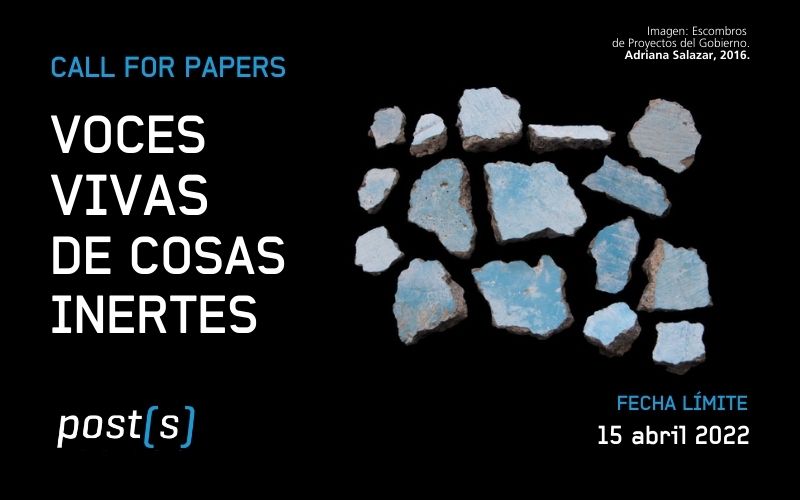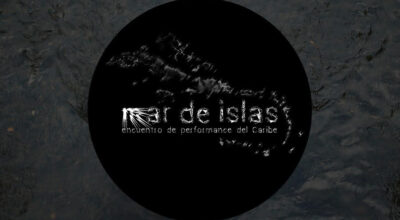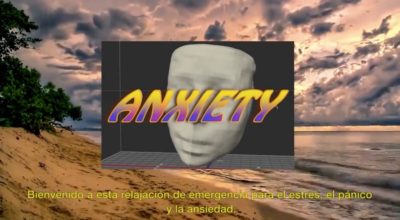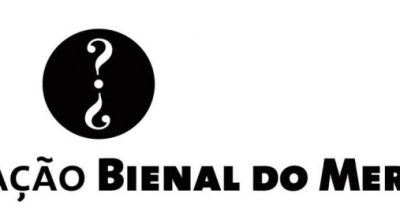
CONVOCATORIA REVISTA POST(S) 8. VOCES VIVAS DE COSAS INERTES
[ENGLISH VERSION BELOW]
post(s) es una revista anual del Colegio de Comunicación y Artes Contemporáneas de la Universidad San Francisco de Quito que publica textos de investigación académica y crea espacios para formas experimentales y performativas de escritura y producción de conocimiento.
Para su octava edición, la revista convoca a autoras y autores a enviar ensayos académicos que analicen las problemáticas planteadas por la editora invitada Adriana Salazar, artista e investigadora colombiana (Universidad Nacional Autónoma de México) que vive en la Ciudad de México. Para este nuevo número, se hace un llamado a quienes “las cosas inertes” les hablan y busquen desestabilizar la división ontológica entre lo vivo y lo inerte.
La convocatoria estará abierta hasta el 15 de abril de 2022
Envíos: plataforma OJS
Más detalles: información para autorxs
VOCES VIVAS DE COSAS INERTES
¿Cómo comprendemos la división entre lo vivo y lo inerte? ¿Qué voces ocupan actualmente nuestra escucha? ¿Cómo podríamos escuchar de nuevo las voces silenciadas de lo inerte?
post(s) 8 busca construir una polifonía de voces que enuncien la agencia de aquello que, a través de prácticas sistemáticas de borramiento, se ha considerado inerte. Deseamos recibir contribuciones de quienes, desde sus propias prácticas de vida o investigación, son explícitamente interpelades por aquello que María Puig de la Bellacasa llama los mundos-más-que-humanos (2017): aquellos mundos descentrados del régimen capitalocéntrico que instaura e insiste en las divisiones entre naturaleza y cultura, entre humanidad y no humanidad, entre vida y no vida.
Contemplamos maneras experimentales e inusitadas de aproximarse a este campo de problemas desde las potencias poéticas del texto, el sonido, la imagen y sus distintos entrecruces. Buscamos acercamientos que provengan de diferentes espacios territorializados cuya materialidad susurre, cante o grite de un modo particular. Invocamos las voces de selvas, llanos, bosques, desiertos, cerros, ríos, lagos, manantiales, minerales, plantas, animales, ciudades, artefactos y todo aquello que desde sus propios rasgos, tensiones o fuerzas proponga alternativas a las voces humanas hegemónicas.
Lee la convocatoria completa de post(s) 8
En caso de dudas escribir a: posts@usfq.edu.ec
POST(S) 8: LIVING VOICES OF INERT THINGS
post(s) is an annual publication of the College of Communication and Contemporary Arts of the Universidad San Francisco de Quito – USFQ. post(s) publishes academic research papers, and also experimental and performative forms of writing and knowledge production.
For the 8th edition of post(s), we are accepting academic essays that examine problematics proposed by our new guest editor, artist and researcher Adriana Salazar (Universidad Nacional Autónoma de México). For the next issue we call upon those to whom the “inert things” speak and invite to destabilize the ontological division between the living and the inert.
Deadline: April 15, 2022
Submissions: OJS platform
More details: information for authors
How do we understand the division between the living and the inert? What voices currently occupy our listening? How can we listen again to the silenced voices of the inert?
post(s) 8 seeks to build a polyphony of voices that enunciate the agency of what, through systematic practices of erasure, has been considered inert. We wish to receive contributions from those who, from their own life or research practices, are explicitly interpellated by what María Puig de la Bellacasa calls the more-than-human worlds (2017): those worlds decentered from the capitalocentric regime that establishes and insists on the divisions between nature and culture, between humanity and non-humanity, between life and non-life.
We also contemplate other experimental and unusual ways of approaching this field of problems from the poetic potencies of text, sound, image and their different intersections. We seek approaches that come from different territorialized spaces whose materiality whispers, sings or shouts in a particular way. We invoke the voices of jungles, plains, forests, deserts, hills, rivers, lakes, springs, minerals, plants, animals, cities, artifacts and everything that from its own features, tensions or forces proposes alternatives to the hegemonic human voices.
Read the full text: Call for Papers
Questions may be addressed to: posts@usfq.edu.ec
También te puede interesar
CONVOCATORIA: MAR DE ISLAS. ENCUENTRO DE PERFORMANCE DEL CARIBE
¿Es posible imaginar una comunidad caribeña que permita la movilidad libre y accesible de personas entre islas y la coordinación conjunta de decisiones económicas, ambientales, sociales y culturales? ¿Cómo desde nuestros vínculos, roles y...
CONVOCATORIA: HÁBITOS TECNOLÓGICOS. CUERPOS Y MOVIMIENTOS
En su segunda edición, Byte Footage continúa su investigación sobre la apropiación y el uso del archivo digital en clave latinoamericana. Frente al contexto mundial actual de distanciamiento social, estamos ante una circunstancia sin...
Convocatoria:contra el Canon.arte, Feminismo(s) y Activismos – Siglos Xviii a Xxi
Como curadora de la 12° Bienal de Mercosur, que se celebrará del 9 de abril al 5 de julio de 2020 en Porto Alegre (Brasil), la historiadora del arte Andrea Giunta (Buenos Aires, 1960)...



